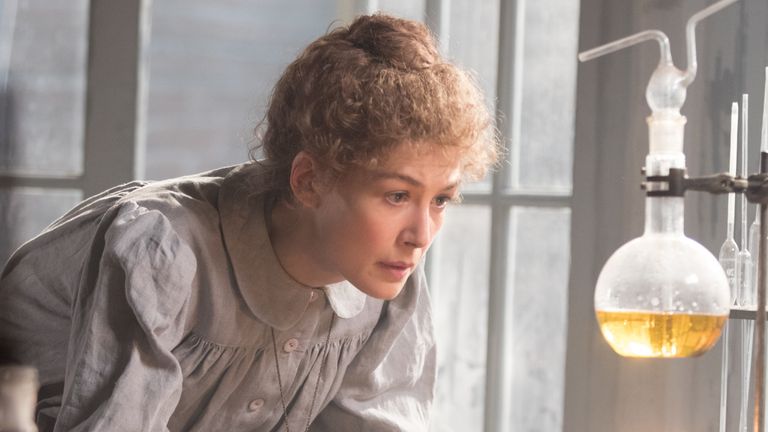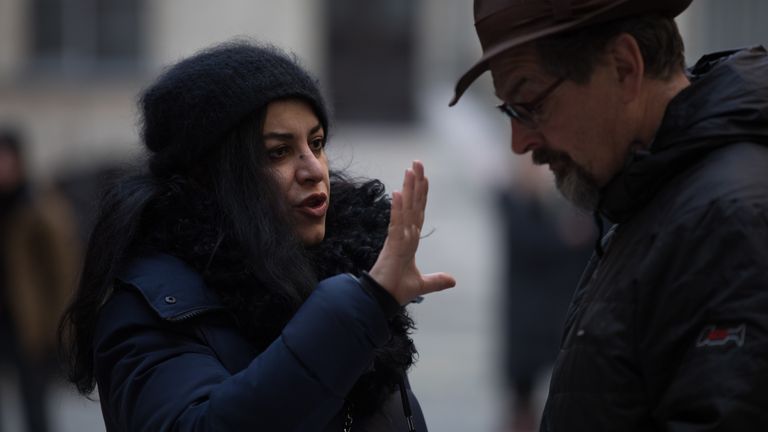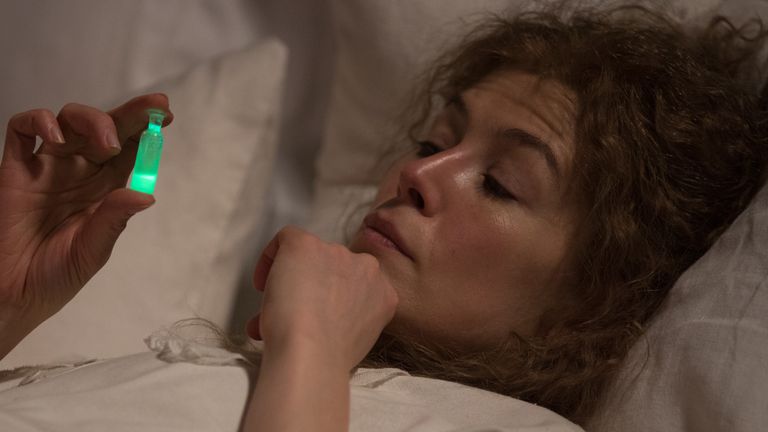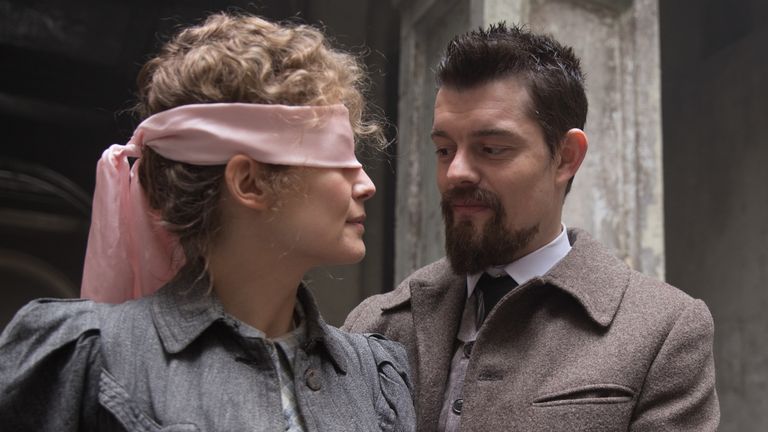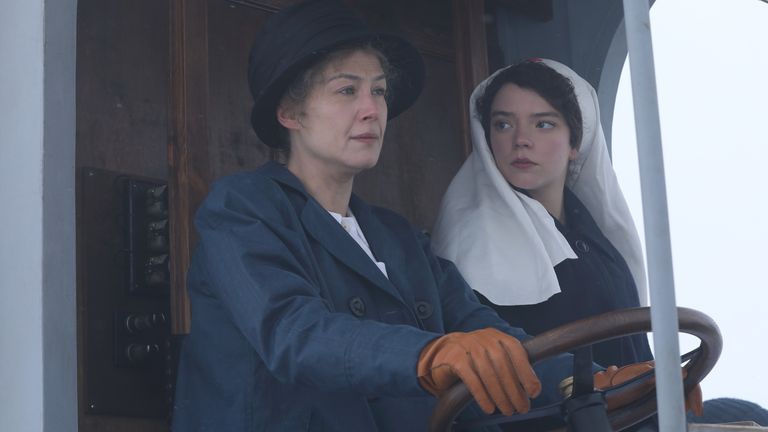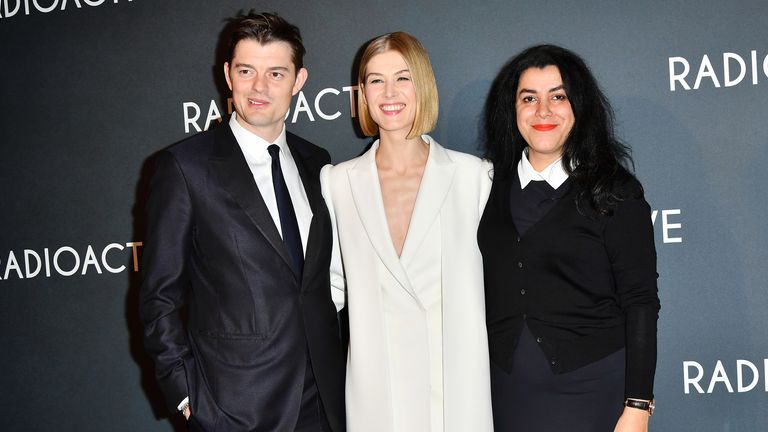Rosamund Pike: ‘Women are part of the inequality problem… that’s got to change’ | Ents & Arts News
[ad_1]
Rosamund Pike says women need to “speak the truth to power” and stop judging themselves and one another if we want to achieve true gender equality.
The Gone Girl star plays Marie Curie in biopic Radioactive, and says despite the role being historical she believes we can still learn a lot from the French-Polish scientist.
Pike told Sky News our patriarchal society is partly to blame for the different standards to which men and women are held.
“You don’t realise how many constructs are in your brain because of that narrative and your expectations.
“Something like The Daily Mail will always remark if they’re telling a story on how old the woman is. Sometimes it’s humorous – ‘X woman, 53, with X woman, 23, and this man’ – and the man’s age is never mentioned.
“But it’s women who are asking for the age to be declared. It isn’t men, they don’t give a toss about it.
“It’s other women who want to know, measure themselves and judge themselves accordingly. I think that’s part of what’s got to change as well.”
:: Listen to the Backstage podcast on Apple Podcasts, Google Podcasts, Spotify, Spreaker
Touching on the recent #MeToo scandals which have rocked the film industry, Pike says women too have their part to play.
“I’m actually interested in women who speak the truth to power.
“And I think if anything comes out of the #MeToo movement, it’s that girls are going to have the courage to do that in our industry.
“Certainly the young girls I’m working with now on the series I’m shooting, I’m encouraging them to do that at every turn. If something’s not right, speak. But don’t say ‘I’ve got to do this sex scene on Monday, nobody’s discussed it with me’.
“Make sure someone discusses it with you, or don’t show up. Make sure you have that conversation. Make sure you’re protected. Speak your truth to power.”
Director Marjane Satrapi agrees: “It’s also our responsibility as women to change [the way women are judged]. We can complain about men’s attitudes… but in this patriarchal system who is teaching the values to kids? It’s the mothers. So we have the responsibility to raise them differently.”
Pike says the story of Curie’s life and work is the perfect example to set today’s children.
The first person to win two Nobel prizes, Curie’s discovery of the elements radium and polonium alongside her husband, fellow scientist Pierre Curie, led to the discovery of effective cures for cancer and the invention of X-rays.
Pike says her work was extraordinary.
“For me, the great force is you win one [Nobel prize] and you’re not satisfied. So you win it in physics, you retrain in chemistry and you win it again. That’s pretty cool.”
A photo in the movie, taken in 1927 at the Solvay Conference – a meeting of great scientific minds to discuss the newly discovered quantum theory – shows Curie sat among a sea of men, most notably Albert Einstein in the front row.
But despite her achievements, Curie’s respect was hard won.
Born Maria Sklodowska in Warsaw in 1867, she faced discrimination for both her gender and her Polish heritage.
Pike says that didn’t let that stop her.
“She lived equality. She took it as her right. She was too busy to fight for it, she just owned it.”
As a mother-of-two, Curie was also restricted by society’s expectation that she would keep house and play mother.
The movie highlights Curie’s frustration at being left at home to look after the children, as Pierre accepts their jointly won Nobel prize in Sweden and is promoted at work.
Pike agrees that Curie wasn’t necessarily the model mother.
“Our film never tried to make a paragon of virtue out of Curie because if she was sweet, lightness and the perfect mother, she wouldn’t be Madame Curie…
“She might be your wife or girlfriend, but we have to deal with someone with flaws as well as brilliance… If we don’t have a woman with regrets, we haven’t got a real woman.”
Zipping back and forth in time, the film also shows both the positive and negative influences of radium.
While radiotherapy is a successful treatment for cancer and radium led to the invention of X-rays, the element is also to blame for the nuclear bomb and the Chernobyl disaster.
Curie died in 1934 from an illness related to her exposure to radioactivity, but she passed on the scientific baton to her daughter Irene who won a Nobel prize for her scientific research into artificial radioactivity the following year.
The element radium is described in the film Radioactive as “most remarkable, because it does not behave like it should”.
A description which perfectly matches the woman who discovered it, and in doing so changed the world.
Radioactive is out on 20 March. A screening, plus a Q&A with Rosamund Pike, Sam Riley and Marjane Satrapi, will be in cinemas today.
[ad_2]
Source link






